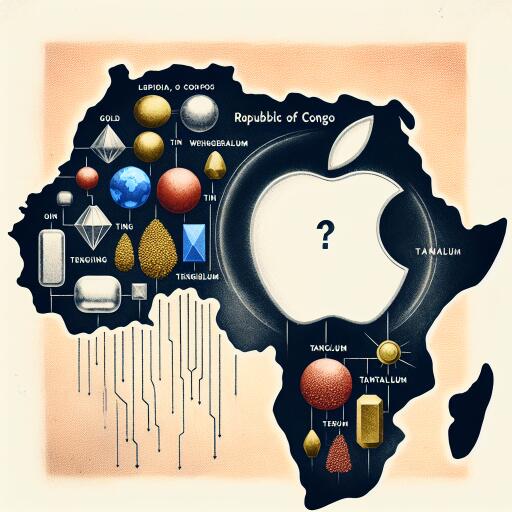Congo Questions Apple Over Knowledge of Conflict Minerals in Its Supply Chain
The Congolese government is currently probing tech giant Apple regarding its awareness and actions related to the prevention of “blood minerals” from conflict zones within the country from infiltrating its supply chains. An urgent request for clarity has been issued, with a tight deadline set at just three weeks for a response.
Representatives of Congo through a team of international lawyers have taken a significant step by reaching out directly to Apple’s CEO, Tim Cook, and its French subsidiary. Their communiqué expressed concerns about the adverse human rights impacts tied to the minerals mined in the eastern part of Congo. These minerals, potentially used in Apple’s diverse product line, raise questions about the ethical transparency of the company’s supply chain amidst an atmosphere where over one hundred armed groups have been implicated in severe civilian atrocities.
The lawyers’ correspondence highlighted the stark reality: “Apple’s offerings, including iPhones, Mac computers, and various accessories, might be intertwined with supply chains marred by the suffering of the Congolese people.” This allegation stands against a backdrop where eastern Congo’s mineral wealth juxtaposes direly with its humanitarian crisis, marked by relentless conflict and significant displacement due to the turf wars over valuable mine territories.
Despite attempts to reach out, Apple’s European press representatives have not provided comments on the matter. Apple has historically distanced itself from employing minerals from areas known for human rights abuses, championing ethical business practices. According to their 2023 report, Apple insists on responsible sourcing, especially from Congo and its vicinity, ensuring their purchases do not contribute to conflict or support armed groups. However, the validity of these claims has been challenged by the Congolese government’s legal representatives, citing a lack of tangible proof.
Suspicions have been raised by the Congo government regarding the possible smuggling of critical 3TG minerals (tin, tungsten, tantalum, and gold) crucial in electronics manufacturing, from Congo to Rwanda, and their subsequent entry into the global market. This issue is further complicated by allegations of Rwanda’s involvement with the M23 rebel group in eastern Congo, purportedly to facilitate illegal mineral extraction – charges that Rwanda vehemently denies.
The governmental lawyers referenced a report by Global Witness in 2022, indicating Apple’s insufficient measures to prevent the utilization of smuggled minerals. With the aim to address the exploitation of “blood minerals,” the Congo government is seeking to hold global end-users accountable, pressing Apple to shed light on its supply chain verification processes within a three-week frame. Additionally, they hinted at a forthcoming report detailing Rwanda’s role and private entities in the mineral laundering process, with the promise of exploring legal avenues against entities like Apple based on the Congo government’s directives.
This inquiry into Apple’s supply chain ethics spotlights the broader challenges companies face in ensuring their operations do not inadvertently support or benefit from global conflicts and human rights violations. As stakeholders wait for Apple’s response, the international community watches closely, anticipating the potential implications for corporate responsibility and ethical sourcing practices worldwide.
